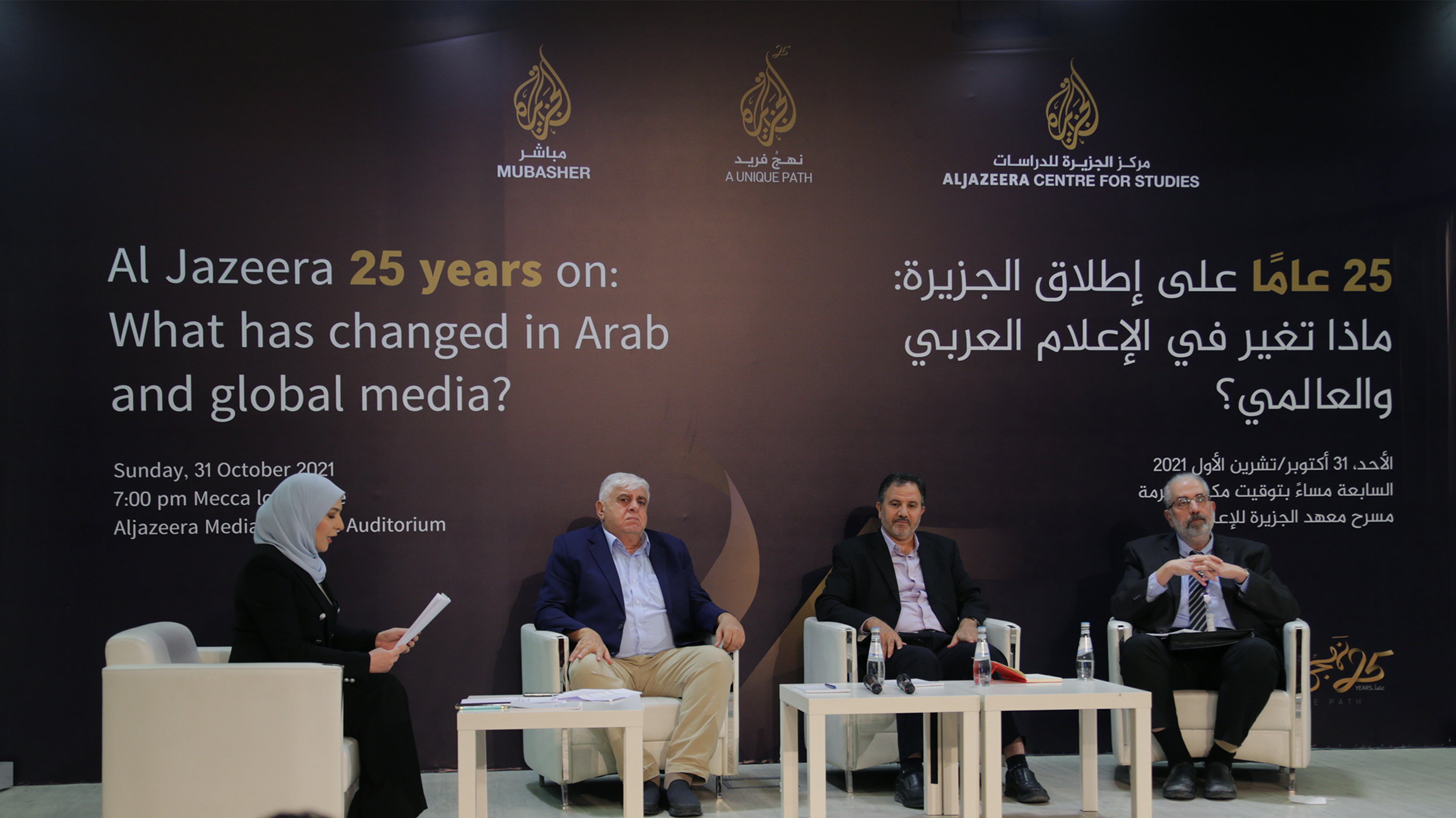
Al Jazeera Centre for Studies (AJCS) and Al Jazeera Mubasher hosted a seminar titled “Al Jazeera 25 years on: What has changed in Arab and global media?” on 31 October 2021. The seminar brought together Ahmed Al Sheikh, former editor-in-chief of Al Jazeera Arabic; Noureddine Miladi, Professor of Mass Communication at Qatar University; and Ibrahim Abu Sharif, Associate Professor in Residence in the Journalism and Strategic Communication Program at Northwestern University in Qatar; and was moderated by Al Jazeera Mubasher presenter Waad Zakaria.
The seminar highlighted Al Jazeera’s experience, and speakers discussed the extent to which Al Jazeera’s channels and institutions are keeping pace with the changes in the media landscape while adhering to the network’s editorial and ethical standards. The speakers in the seminar analysed the the impact Al Jazeera has had on the Arab media scene in both form and content. They also analysed Al Jazeera’s impact on public awareness, especially after its success in ending the domination of major capitals of the global media landscape.
The speakers noted that these developments had effectively changed the nature of the audience, which now interacts with the media message, influences its content, and is often its sender and content creator.
In this context, the speakers stressed that what distinguishes Al Jazeera, since its inception in 1996, is the bias of its editorial line towards human issues and its great margin of freedom. In this environment, the opposition’s voices were heard on television for the first time. Moreover, the order of news bulletins was set according to their importance to the audience, which was not the case in the Arab media before Al Jazeera. Most of the news was related to the activities of presidents, kings and other senior officials and did not take the priorities of the viewers into account.
Furthermore, the speakers noted that Al Jazeera provided information to its viewers after it had been monopolised by state-run media organisations that had very little freedom, thus depriving viewers of their right to know. They added that the secret behind Al Jazeera’s excellence was that it not only provided the news, but also put it in context and examined its backgrounds, dimensions, motives and reasons. This approach had a significant contribution to increasing the audience’s awareness and understanding.
In addition, speakers at the seminar added that Al Jazeera provided another narrative of events, particularly with regard to controversial issues such as the Palestinian cause and the invasion of Afghanistan and Iraq following 9/11. They noted that Al Jazeera’s narrative freed the Arab viewer of the one-sided narrative of Israeli or Western media
Moreover, the speakers explained that Al Jazeera’s professionalism, both in the balance, objectivity, accuracy and diversity of its content as well as the technical side (photography, presentation and directing), has created competition that has prompted many state-run and privately-owned channels improve their performance in order to maintain their audiences, a lot of whom have turned to Al Jazeera's screens.
In the latter part of the seminar, speakers addressed the issue of Al Jazeera’s access to the digital media age, and noted its excellence in this area as well. For example, they discussed the experience of AJ+, which is a platform that is geared towards younger audiences with content in four different languages (i.e. Arabic, English, French and Spanish). AJ+ provides content that appeals to the interests of the youth and is consistent with their priorities in an interesting, attractive and concise manner characterised by visual and auditory richness. The speakers remarked that the platform gained a large audience that exceeded expectations after the number of views of its videos, in the four languages, reached billions.
The speakers also referenced Al Jazeera’s social media platforms such as Facebook, Twitter and YouTube, stating that the number of followers of Al Jazeera’s content has reached millions. In this regard, they explained that while Al Jazeera has benefited from digital platforms, it has provided them with a useful addition in return. They also noted that Al Jazeera’s digital platforms sometimes treat social media sites as a source of news, once they have ascertained the accuracy and credibility of the content.
The remarks of the speakers and followers on social media platforms were not free of criticism towards Al Jazeera, particularly with regard to what they described as Al Jazeera's political alignment. Ahmed Al Sheikh responded to the criticism, explaining, “Al Jazeera is ultimately human work, and mistakes are likely; however, if it discovers the mistake, it corrects it. Al Jazeera’s experience should be judged on its overall performance over the past 25 years, which has been rich and unique in its entirety.”
At the end of the seminar, speakers shed light on the future of Al Jazeera. They pointed out that the future looks promising if Al Jazeera remains committed to its editorial guide, approach and mission, especially as it pertains to its bias towards human issues in general and the Arab nationalism, especially through its content on Arabic-speaking platforms.